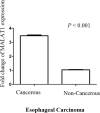Gene expression profiling of lncRNA-HOTAIR and lncRNA-MALAT1 in esophageal cancer: uncovering links to lifestyle factors and diagnostic significance
- PMID: 40295320
- PMCID: PMC12037955
- DOI: 10.1007/s12672-025-02465-8
Gene expression profiling of lncRNA-HOTAIR and lncRNA-MALAT1 in esophageal cancer: uncovering links to lifestyle factors and diagnostic significance
Abstract
Background: Esophageal cancer (EC) is the sixth most common cause of cancer-related deaths globally. Genetic and environmental factors could be affected in EC's onset and development. The potential involvement of lncRNA-HOTAIR and lncRNA-MALAT1 in EC has garnered significant attention in recent studies. Our investigation aimed to examine lncRNA-HOTAIR and lncRNA-MALAT1 gene expression changes in EC patients.
Materials and methods: Our experimental study focused on 140 patients with malignant EC, comprising 70 paraffin-embedded tumor tissues (FFPE) blocks and 70 FFPE blocks with marginal tissue samples. The relative gene expression levels of lncRNA-HOTAIR and lncRNA-MALAT1 were measured using Real-Time PCR. The data were analyzed using ANOVA and 2-△△CT tests.
Results: Our analysis revealed a significant increase in tumor expression compared to marginal tissues (P < 0.05). Besides, our research revealed a significant correlation between lncRNA-HOTAIR expression and hot drinks (P = 0.019), metastasis (P = 0.001), and the 5-year survival rate (P = 0.001). We found a significant correlation between lncRNA-MALAT1 expression and alcohol abuse (P = 0.039), hot drinks (P = 0.001), and metastasis (P = 0.039).
Conclusion: The findings indicate a potential carcinogenic effect of lncRNA-HOTAIR and lncRNA-MALAT1 gene expression alterations in EC patients. Also, studying the lncRNA genes can help us identify biomarkers, emphasizing the significance of early diagnosis and treatment.
Keywords: HOTAIR; MALAT1; Esophageal cancer; LncRNA.
© 2025. The Author(s).
Conflict of interest statement
Declarations. Ethics approval and consent to participate: The work was approved by the Ahar Branch Islamic Azad University (MSc.ID: 950187436), and informed written consent was filled out by all participants. All procedures performed in studies involving human participants were in accordance with the ethical standards of the institutional research committee. Consent for publication: Not applicable. Competing interests: The authors declare no competing interests.
Figures
Similar articles
-
LncRNA HOTAIR-mediated MTHFR methylation inhibits 5-fluorouracil sensitivity in esophageal cancer cells.J Exp Clin Cancer Res. 2020 Jul 11;39(1):131. doi: 10.1186/s13046-020-01610-1. J Exp Clin Cancer Res. 2020. PMID: 32653028 Free PMC article.
-
Long non-coding RNA HOTAIR functions as miRNA sponge to promote the epithelial to mesenchymal transition in esophageal cancer.Biomed Pharmacother. 2017 Jun;90:888-896. doi: 10.1016/j.biopha.2017.03.103. Epub 2017 Apr 22. Biomed Pharmacother. 2017. PMID: 28441714
-
Exploration of the association between HIF3α mRNA and lncRNA MALAT1 in laryngeal squamous cell carcinoma by correlation analysis.Oncol Lett. 2024 May 1;28(1):292. doi: 10.3892/ol.2024.14425. eCollection 2024 Jul. Oncol Lett. 2024. PMID: 38737978 Free PMC article.
-
Pathways and role of MALAT1 in esophageal and gastric cancer.Oncol Lett. 2021 May;21(5):343. doi: 10.3892/ol.2021.12604. Epub 2021 Mar 2. Oncol Lett. 2021. PMID: 33747200 Free PMC article. Review.
-
Prognostic role of lncRNA HOTAIR in esophageal squamous cell carcinoma.Clin Chim Acta. 2016 Dec 1;463:169-173. doi: 10.1016/j.cca.2016.10.035. Epub 2016 Nov 1. Clin Chim Acta. 2016. PMID: 27810266 Review.
Cited by
-
KRT6A, KRT6B, PKP1, and PKP3 as key hub genes in esophageal cancer: A combined bioinformatics and experimental study.Biochem Biophys Rep. 2025 Jun 22;43:102095. doi: 10.1016/j.bbrep.2025.102095. eCollection 2025 Sep. Biochem Biophys Rep. 2025. PMID: 40612005 Free PMC article.
References
-
- Uhlenhopp DJ, Then EO, Sunkara T, Gaduputi V. Epidemiology of esophageal cancer: update in global trends, etiology and risk factors. Clin J Gastroenterol. 2020;13(6):1010–21. - PubMed
-
- Amirmahani F, Vallian S, Asadi MH. The LncRNA MIAT is identified as a regulator of stemness-associated transcript in glioma. Mol Biol Rep. 2023;50(1):517–30. - PubMed
-
- Sadeghpour S, Ghorbian S. Evaluation of the potential clinical prognostic value of lncRNA-BANCR gene in esophageal squamous cell carcinoma. Mol Biol Rep. 2019;46(1):991–5. - PubMed
-
- Aalijahan H, Ghorbian S. Clinical application of long non-coding RNA-UCA1 as a candidate gene in progression of esophageal cancer. Pathol Oncol Res. 2020;26(3):1441–6. - PubMed
LinkOut - more resources
Full Text Sources


